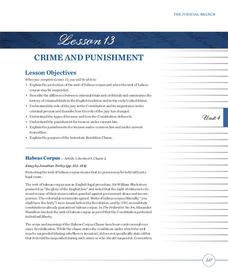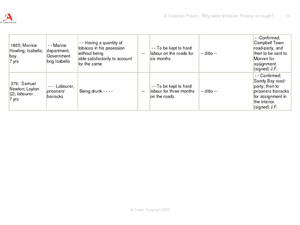National Endowment for the Humanities
Dostoevsky's Crime and Punishment
Pain and suffering do not have to be inevitable in a study of Crime and Punishment. A carefully scaffolded lesson introduces readers to the divided natures of the characters in Fyodor Dostoevsky's complex novel. Groups use the...
Deliberating in a Democracy
Crime and Punishment
Should the United States ban the death penalty? Scholars use real-life examples of criminal activity to come to their own conclusions on the death penalty. Primary source documents, as well as video clips, open the issue of capital...
Heritage Foundation
Crime and Punishment
You wouldn't give someone a 10-day timeout for eating a piece of candy. The US government, too, does not believe in unreasonable punishment. A variety of exercises exploring the clauses of the US Constitution prompts class members to...
Curated OER
Split Character Studies in Crime and Punishment
Students identify characters who exhibit conflicting character traits. In this Crime and Punishment instructional activity, students identify and discuss characters who have opposing character traits. Students relate their...
Teaching Tolerance
Critiquing Hate Crimes Legislation
The high school lesson explores what hate crimes are and how the government has responded to those crimes. Academics read legislation, analyze political cartoons, and complete hands-on-activities to understand what motivates individuals...
National Endowment for the Humanities
Man and Superman
Ordinary and extraordinary readers will find much to contemplate in a lesson on Crime and Punishment as they examine the dichotomies in Dostoevsky's novel. Scholars reflect on Raskolnikov's theory that extraordinary individuals are not...
Curated OER
Theories of Crime and Punishment
Students examine goals of two major theories of punishment, Utilitarian Theory and Retributive Theory, develop opinions about ethics and effectiveness of both theories, define legal duties of prosecutors and public defenders, and discuss...
Curated OER
Hate-Crimes and Punishment
Students research and write about the effectiveness of hate-crime legislation in the United States
Curated OER
"Split" Character Studies in Crime and Punishment
Students write an essay evaluating split character traits on major characters in Dostoevsky's novel Crime and Punishment. In this lesson students are guided through discussion questions, group assignments, and vocabulary work. The lesson...
Deliberating in a Democracy
Juvenile Justice
Pupils compare and contrast the legal system as it pertains to juvenile and adult crime and punishment. Incorporating primary documents, legal decisions, and video evidence, individuals form an argument debating the treatment of...
National Endowment for the Humanities
Societal Schisms and Divisions
The final lesson in the Crime and Punishment unit looks at the societal injustices depicted in Dostoyevsky's novel. Scholars examine the schisms between men and women, between wealth and poverty, between religion and skepticism, and...
BBC
Crime
Crime and punishment! Learners discuss the law, civics, and crime in the UK. They brainstorm lists of crimes and possible punishments, complete activities on a website, role-play a Juvenile Court scenario, and try to think of ways they...
Curated OER
A Victorian Prison
Prisons in Victorian England were miserable places, designed to deter people from committing crimes. To understand why these prisons were so tough, young historians review documents and pictures from Coldbath Fields prison. After...
Curated OER
Children's Accountability for Their Crimes
Students participate in a round-table discussion about the juvenile justice system and investigate the 'age of accountability' debate. They write a persuasive essay supporting or refuting the punishment received by the children discussed...
Curated OER
White Collar Crime
High schoolers discuss difference between crimes of deceit versus crimes of violence, define white-collar crime, and examine far reach of white collar crime laws. Students then analyze what differences exist between rationales for...
Curated OER
Crimes from Mother Goose
Students use Nursery rhymes in a discussion of crimes and criminals in order to study how criminal law has developed and changed to maintain an organized society. They decide on the identity of criminals, the crime, and the name of the...
Curated OER
The Candy Thief
Students research crimes and corresponding punishments of students. They interview local judges to see if they try to match the punishment with the crime. Students write an analysis article about crimes and their punishments in your...
Curated OER
Shame on You!
Should public humiliation be an acceptable consequence for a crime? Have your middle schoolers engage in a round table discussion about the recent resurgence of the use of public humiliation as a punishment for crimes in the United...
Curated OER
Who Decides Who Dies?
Students explore various state laws concerning capital punishment and conduct a mock meeting of the United States Congress to set standards for the death penalty.
Curated OER
The Row Behind Death Row
Students investigate several controversial issues in the criminal justice system relating to death row and give oral reports explaining how their issues safeguard or contaminate the issue of fairness in capital punishment. They offer...
Curated OER
The 8th Amendment: The Death Penalty
Students take a closer look at the death penalty. For this U.S. government lesson, students watch a Discovery video about capital punishment in the United States and then compose letters to the editors of newspapers about their stance on...
Curated OER
The Candy Thief
Students research what kind of punishments local judges give for these. Students research what kind of punishments other judges elsewhere might give. Students report their findings to the class and perhaps to local judges or another...
Curated OER
Parents Hand Out Unusual Punishments
Students discuss how they are disciplined at home, then read a news article about some unusual punishments given to children. In this current events lesson, the teacher introduces the article with a discussion and vocabulary activity,...
Curated OER
Do We Need a Permanenet International Criminal Court?: War Crimes, Violence, International Law and Politics, Nuremberg
In this lesson, students explore the history, relevance and current application of international tribunals for war crimes. Students look at cases from the Nuremberg trials, Tokyo trials and the Bosnian War.

























